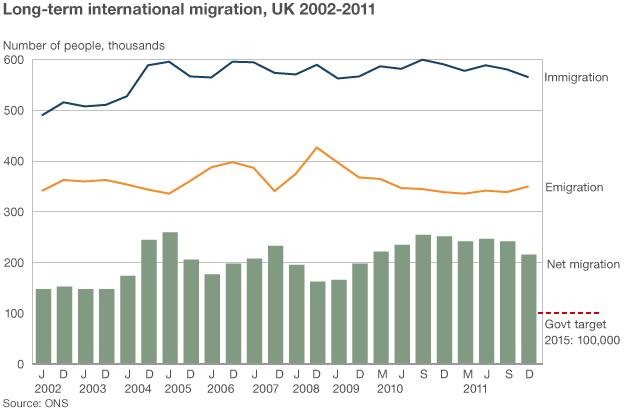UK net migration numbers decrease - ONS
- Published
Net migration to the UK has fallen but remains at more than double the government's target of fewer than 100,000 a year.
The Office for National Statistics said that estimated net migration in the year to December 2011 was 216,000 - down from 252,000 the previous year.
It said the fall was not statistically significant, but ministers say separate figures show they are on course.
Net migration is the number of people entering the UK, minus those leaving.
The government has a target to cut net migration to tens of thousands by the end of the Parliament.
Speaking after the release of the latest figures, Immigration Minister Damian Green said he was "confident" that target would be met.
He also described the latest net migration figures as "the first sign that the measures we've been taking since we arrived in government two years ago are having an effect".
"We are doing this by improving the selectivity of our immigration system and increasing enforcement activity to prevent people coming into the UK illegally and removing those with no right to be here.
"At the same time, there are encouraging signs that we continue to attract the brightest and best and to support tourism in the UK."
Student visas drop
But the Institute for Public Policy Research think-tank said the figures showed "the folly of the government's target to reduce net migration to less than 100,000 a year".

Associate director Sarah Mulley said: "The combination of recession and immigration policy changes may be starting to have an impact but more than a third of the fall is due to a rise in emigration.
"The statistics show that the government remains a long way from its goal."
There has also been a large drop in student visas in the year to June 2012, with 282,833 being granted during that period.
This means that more than 75,000 fewer student visas were issued in the year to June than in the previous 12 months - a drop of 21%.
Michael Cornes, of the international education provider Study Group, said these figures were "concerning for the higher education sector and education industry as a whole" and were a "wake-up call" for the government.
"A drop in international students will damage our universities, which rely on the economic contribution these students make, and deny domestic students the opportunity to mix with multinational academic peers," he said.
The number of National Insurance numbers allocated to non-UK nationals in the year to March this year fell by 15%.
The number of work-related visas issued in the year to June 2012 fell by 7%.
Birth rates
Meanwhile, the ONS said a record number of babies were born in the UK last year to mothers who came from outside the country.
Figures showed that 25.5% of all children born in 2011 had foreign-born mothers, compared with 25.1% the year before.
It is the highest proportion of births to non-UK born mothers since the country of origin for parents was introduced into birth registration in 1969.
Poland continues to be the most common country of origin for mothers not born in the UK.
Sir Andrew Green, chairman of Migration Watch UK, which campaigns for tougher controls on immigration, said net migration remained "far too high".
He added: "The government must ensure that they pursue the national interest ahead of vested interests.
"They now need a blitz on bogus students and much tougher action on enforcement and removal. For too many years we have had only a token effort at tackling illegal immigration."
But the Migration Observatory, which is based at the University of Oxford, said margins of error mean that net migration figures could actually be 35,000 higher or lower that those stated by the ONS.
It said: "The uncertainty in the UK's migration estimates means that it is very difficult to assess how well the government is progressing toward its target of reducing net migration to the 'tens of thousands', or to evaluate the effects of specific policy changes.
"In simple terms, the government could miss the 'tens of thousands' target by many tens of thousands and still appear to have hit it. Conversely the government could hit, or even exceed its target and still appear to have missed it."
- Published14 April 2011
- Published25 August 2011
- Published16 July 2012